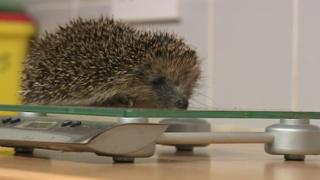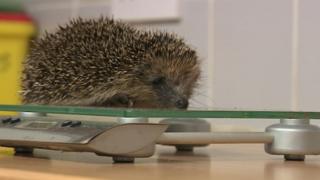Hoglets ‘too light to hibernate’ after wet summer, charity says
A wildlife centre in Leicestershire says it is “overwhelmed” with the numbers of underweight hoglets. …


Hundreds of baby hedgehogs are having to be rescued because wet weather has left them too underweight to hibernate, a wildlife charity has said.
Leicestershire Wildlife Hospital said it has been “overwhelmed” and claim it is their worst year yet.
The centre already has more than 200 hoglets in its care – double the number it had this time last year.
They put the rise down to this year’s unseasonably wet weather drowning babies born earlier in the year.
Ang Downham, the centre’s founder, explained this means mothers are having another litter to replace them, but said it is too late in the year.
The new babies do not have time to fatten up enough to survive hibernation, she said.
Mrs Downham said: “We have had babies coming in non-stop, tiny, tiny babies – we’ve never had such small ones before and it’s pitiful to see.
“It’s overwhelming. I think we’re fighting a losing battle, the weather is so against them and they do not seem to be adapting to the changes.”
Fay Vass, CEO of the British Hedgehog Preservation Society, said milder winters are also a problem for the animals, because when it is warmer, they use energy to get ready to wake up, but if it turns cold again that hard-won energy is wasted.
Problems like this and a loss of habitat means the UK’s hedgehog population has dropped by about half since the turn of the century.
“This is a massive, massive decline,” she added. “We need to do everything we can to prevent it.”
Follow BBC East Midlands on Facebook, Twitter, or Instagram. Send your story ideas to eastmidsnews@bbc.co.uk.


